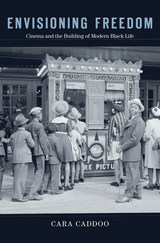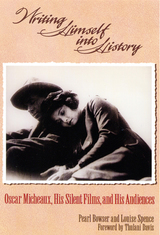
Viewing turn-of-the-century African American history through the lens of cinema, Envisioning Freedom examines the forgotten history of early black film exhibition during the era of mass migration and Jim Crow. By embracing the new medium of moving pictures at the turn of the twentieth century, black Americans forged a collective—if fraught—culture of freedom.
In Cara Caddoo’s perspective-changing study, African Americans emerge as pioneers of cinema from the 1890s to the 1920s. Across the South and Midwest, moving pictures presented in churches, lodges, and schools raised money and created shared social experiences for black urban communities. As migrants moved northward, bound for Chicago and New York, cinema moved with them. Along these routes, ministers and reformers, preaching messages of racial uplift, used moving pictures as an enticement to attract followers.
But as it gained popularity, black cinema also became controversial. Facing a losing competition with movie houses, once-supportive ministers denounced the evils of the “colored theater.” Onscreen images sparked arguments over black identity and the meaning of freedom. In 1910, when boxing champion Jack Johnson became the world’s first black movie star, representation in film vaulted to the center of black concerns about racial progress. Black leaders demanded self-representation and an end to cinematic mischaracterizations which, they charged, violated the civil rights of African Americans. In 1915, these ideas both led to the creation of an industry that produced “race films” by and for black audiences and sparked the first mass black protest movement of the twentieth century.

Winner of the 2001 Kraszna-Krausz Moving Image Book Awards | Winner of the Theatre Library Association Award
Writing Himself Into History is an eagerly anticipated analysis of the career and artistry surrounding the legendary Black filmmaker Oscar Micheaux. With the exception of Spike Lee, Micheaux is the most famous—and prolific—African American film director. Between 1918 and 1948 he made more than 40 “race pictures,” movies made for and about African Americans. A man of immense creativity, he also wrote seven novels.
Pearl Bowser and Louise Spence concentrate here on the first decade of Micheaux’s career, when Micheaux produced and directed more than twenty silent features and built a reputation as a controversial and maverick entrepreneur. Placing his work firmly within his social and cultural milieu, they also examine Micheaeux’s family and life. The authors provide a close textual analysis of his surviving films (including The Symbol of the Unconquered, Within Our Gates, and Body and Soul), and highlight the rivalry between studios, dilemmas of assimilation versus separatism, gender issues, and class. In Search of Oscar Micheaux also analyzes Micheaux’s career as a novelist in relation to his work as a filmmaker.
This is a much-awaited book that is especially timely as interest in Micheaux’s work increases.
READERS
Browse our collection.
PUBLISHERS
See BiblioVault's publisher services.
STUDENT SERVICES
Files for college accessibility offices.
UChicago Accessibility Resources
home | accessibility | search | about | contact us
BiblioVault ® 2001 - 2024
The University of Chicago Press









